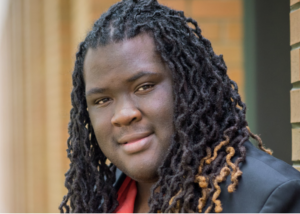Section Editor: Venezia Michalsen
 Profile: Jason M. Williams, Ph.D., Assistant Professor, Montclair State University
Profile: Jason M. Williams, Ph.D., Assistant Professor, Montclair State University
How did you become interested in the field of women and/or gender and crime?
I was raised by my maternal Black American grandmother in a single parent home in a housing project located in Northern New Jersey. So, based on biography, I grew an affinity toward the condition of Black women in impoverished neighborhoods and early on I began to see these conditions as critical criminological subjects (albeit I didn’t have that vocabulary at the time). I watched as women of Color constantly struggled in my community to make it through each day—to be recognized, to matter, and simply to acquire self-determination. I watched as women in my own family deferred their own dreams so that others can dream (which is a critical criminological subject itself). While growing up in this space, however, I also knew that our living conditions were not fair nor acceptable and perhaps those earlier thoughts are what led me to where I am now. However, like many “hoods” mine was devastated by drugs and crime, and I watched how swarms of Black and brown mothers became single parents overnight because of the war on drugs (and other divisive policies). While the state began targeting the men in my community, women suffered in silence as they were left to be the martyrs of our community, and in some cases unfairly blamed for much of the disarray the ensued because of these decapitating (and racially motivated) state policies. But my focus on gender and crime is not on offending, but rather on the discursive ways in which the state enacts policies and control processes that target, restrict and oppress women—and I tend to see these practices as forms of criminality.
How do you define yourself as a scholar/activist/educator?
I define myself as an unapologetic activist first. I am an activist in the traditional sense and in the scholarly context. I am known to hit the streets when I need to but, I am also known to problematize the research literature too. Given my biography, I see myself foremost as a conduit between my community and the scholarly community and the broader university. As an educator, I see it my purpose to forthrightly educate about justice—to intersectionally highlight institutional injustices in ways that humanizes victims and get students thinking critically about justice issues.
What are your current projects or interests?
My current projects include finishing my policing and race book and wrapping up my Ferguson and Baltimore fieldwork projects. I am looking to move my focus on policing and race into Newark NJ where I am hoping to investigate the perceptions and experiences of urban teens. I will continue to study policing (including its more expansive context) and race, however, from a critical ethnographic, critical race, and intersectional lens.
Who is your favorite person (or animal!) to spend time with, and what are your favorite things to do when you are with them?
I love spending time with my grandmother. My favorite thing to do with her is recalling the past. As an avid learner of history, I enjoy listening to her memories of the past, learning more about the family tree, the community and her memories matriculating through periods of overt racial strife.
How do you wind down after a stressful day?
I like to sip tea and binge watch something on Netflix.
What obstacles do you feel you have overcome to be where you are today?
Certainly obstacles of racism and class. I also think losing my parents early (by age 11) had a huge effect on me as a child, as I believe it put me at an increase deficit, but overtime it is something I had learned to overcome. But I am proud of my life experiences and trajectory because they have made me who I am today.
What would you like to be remembered for?
I would like to be remembered for being a fierce unapologetic defender of social justice.
What is one of your lifelong goals?
A lifelong goal is to eventually finish one of my screenplays and get it on film. While I have to write for the academic audience for a living, one of my original dreams was to be an accomplished screenwriter, and from time-to-time, I still entertain those prospects. Growing up as I did, the imagination was the most fun and radically liberating places one could visit, and there I began to develop a talent for writing and developing stories. Even as an academic, I find myself visiting that same place in my current work, as creativity (or out-of-the-box thinking) is something that guides much of what I do even in my academic work.
Is there a website where we can send people for more information about you?
What are one or two of your publications that you feel best represent your work?
